
Improving Support Services for Foster Parents and Children in Foster Care: New Reforms Aim to Support a Child’s Holistic Health and Well-Being
Today on #FosterFridayLive we tackle the hugely broad topic of health and well-being for children in foster care. This is important as there are many reforms aiming to support the health and well-being of children in foster care currently being implemented in South Carolina. We will address some of those reforms and changes here. Foster parents play a crucial role in supporting the overall health and well-being of the children in their care. This is often difficult for foster parents and can quickly become overwhelming as they try to navigate the system.
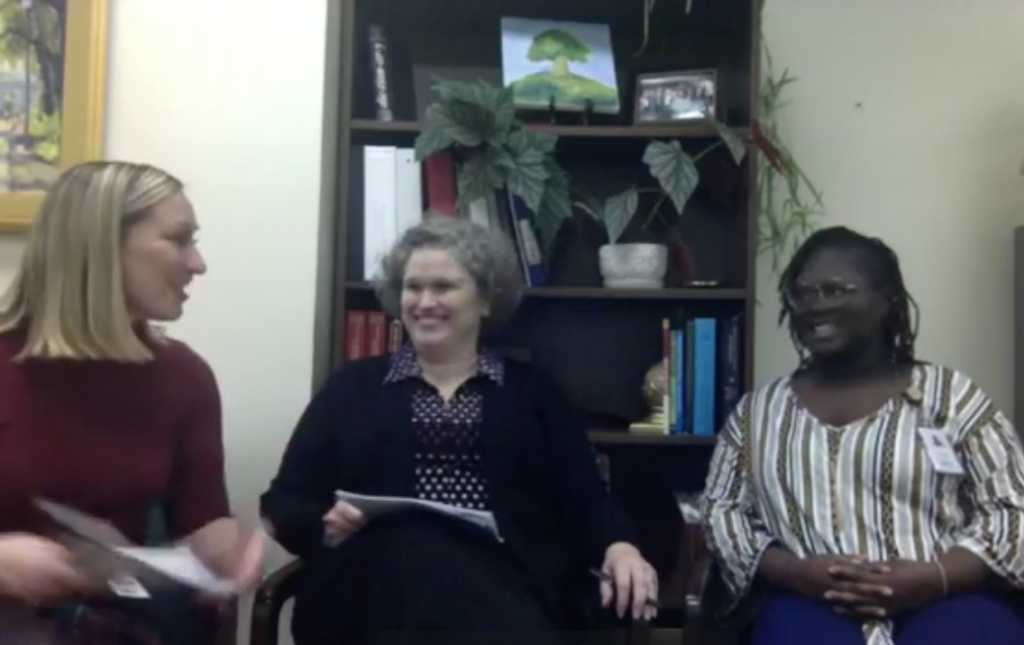
We have the privilege of speaking with some of the professional staff that are helping ease the implementation of these new reforms and supporting foster parents as they navigate the system. Nikki is the Program Coordinator for the Office of Child Health and Well-being. She is a great resource says supervisor, Gwynne. Gwynne is the Director of Child Health and Well-being at DSS. This is a relatively new office. It is almost two years old (2020). It is a part of the reforms and positive changes happening at SC DSS. The office oversees the health of children in care: well-child visits, dental visits, behavioral health, therapy sessions, etc. The well-being part includes all the other things that go into a child’s quality of life. The Office’s impact is measured by Children’s Bureau– looking at metrics such as foster parents being included in the planning for this child, are there regular visitations scheduled, are there a good service array for children.
Gwynne and Nikki are not the frontline professionals that foster parents would reach out to- that would be the caseworker. But still, they love talking to foster parents. Foster parents call often, confused about how something works and what to do. They are very open and happy to help. They have a series of flyers that say, “We’re here to help! Call us!”
What is the role of foster parents in caring for children’s health and well-being?
You are the first advocate for these kids. You are really on the frontlines. You are not only the person to advocate at these appointments, but you are also going to be the ones to communicate back to DSS about what’s happening with that child. A lot of times foster parents are the ones actually making the appointments, taking the child to the appointment, the ones actually sitting in the doctor’s office. For foster parents it can be overwhelming; it’s a lot. But as a foster parent that is one of your primary roles- to help make sure that DSS caseworkers and our office knows what needs to be done to meet the needs of children.
Foster parents are with the children 24/7 which case managers aren’t. They are the experts on that child. If you share with us the behaviors, the needs that you see, we can work together as a team to meet those needs.
There are new reforms regarding the child well-visits which obviously the foster parents would be a part of. Many people may not know that there is an enhanced well-child schedule. If you’ve had a school-aged foster child before you may have only taken them to the doctor for a well-visit once a year. Best practices tell us that children in foster care really need to be seen more by a doctor. They move around a lot, there’s a lot of times when their needs can get missed. But having them in the doctor twice a year after the age of two is really a best practice standard. So this new well-child visit schedule goes:
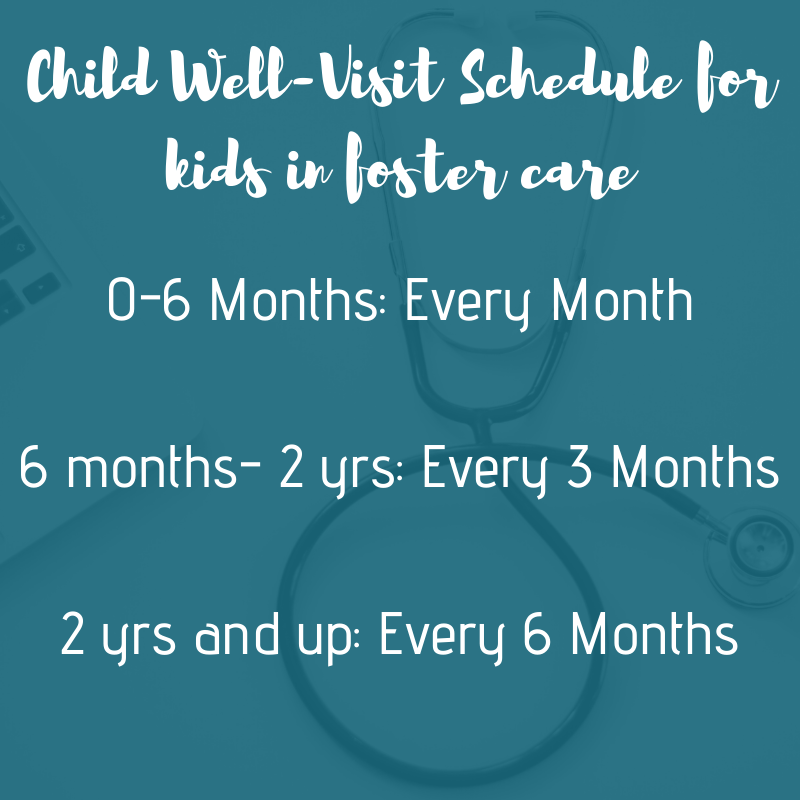
So it goes, 1 month, 3 months, 6 months. It’s just one more than you normally have. We’re on a big push right now with new reforms to make sure that our system knows when the child went to the doctor, what happened at the doctor, what needs to be followed up on. So the most important thing to take away is to make that well-child appointment. If you have a child over the age of two, go make that well-child appointment. If your doctor says, “they’ve already had one,” just call our number ([email protected]; (803)898-7788) and we’ll help you navigate that with Select Health (888-276-2020 and press Option #3.) They’ll call the doctor and say, “we have unlimited well-child visits for children in foster care.” So there is no barrier of insurance or access to resources. Our office will help foster parents help overcome those apparent barriers.
We are genuinely excited about this. We want to see children’s health improve. We’re all in this together. It’s going to take a whole team to make this happen.
What do foster parents need to do or know to be successful in navigating their child’s health and well-being so the child can thrive?
The first thing that foster parents need to know is that you’re not in this by yourself. There is a team of us- case managers, guardian ad litems, medical doctors. The community is there for the foster parent and the child to be as successful as possible.
We have a team. You don’t have to be the expert. You don’t have to know everything. Just take them to the pediatrician and then we’ll take it from there. We have a whole team of people now at DSS. We have a nursing staff now. We have a whole team of dedicated staff at Select Health that weren’t there before. Foster parents may be getting calls from these people. You are encouraged to answer and communicate with them.
Here’s how this works. What happens is that the Select Health team will reach out early on to connect with the foster parent to help set up appointments, figure out where to go, figure out what to do to ease transitions. Part of the process at Select Health now is the Care Coordination unit will call you. They have to verify first for HIPA who they are talking to so that’s why it’s a little awkward at first. It’s designed to be there as a resource. There are so many people that want to be there to coordinate services. It’s okay to answer that call, to give them the information they ask for. They are appropriately helping you. If you are concerned that this is a scam, it’s best to make sure you know what Select Health does. But some foster parents say they didn’t feel comfortable with someone calling them so they have hung up and called them back. Now that you know it’s a call that you should be getting, you might feel better. But you can always call them back, press the number 3 and you’ll go right to the group that works with foster care.
So you can call that number any time, press that option 3, and there are a couple things that they can do for you. Let’s say, you’ve run out of medication or that child just came into care and they don’t have the medication they need. Select Health Team is a great first stopping point. Call your Care Coordinator. You’re desperate! You can call that number (888-276-2020 and press Option #3) and they can help you out. They’re there to help if you have a situation where you’re trying to find a doctor and you’re having a hard time being seen quickly. They can help you find a new doctor. They are the one-stop shop “fairy godmothers” of finding healthcare resources urgently. And they help you problem-solve. Maybe you need some durable medical equipment- they can help you with that. These Select Health teams are for standard and therapeutic foster families. They can help kinship providers as well as long as the child has Select Health as their managed care organization. Children in foster care are automatically given Medicaid and often are assigned Select Health. Even after exiting foster care, children can still get services through their managed care organization. Every managed care organization will have some support resources available, they may just be different.
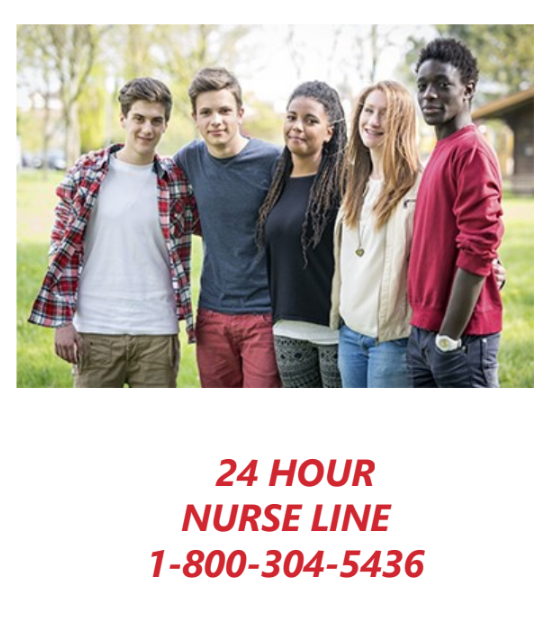
There is also a nursing line. The phone number for the 24/7 nursing staff will be listed on the back of your Select Health card that you get in the mail. It may take awhile for them to call you back, but they will be very helpful.
Talk to us about the new mandatory training for SC foster parents on medical consent and psychotropic medications. Is a foster parent considered a secondary consenter and what does that mean?
Foster parents are considered secondary consenters for children in foster care. They have to fill out a DSS form after they have completed the training. They need to make sure that the certificate is filed with DSS, but they can also bring a copy of that certificate to the doctor’s visits to let them know that they have secondary consenter privileges for the child in their home. A foster parent is not automatically a secondary consenter. They have to first complete the training- once a year. They can be doing the training online or the training is also rolled out as group training through the South Carolina Foster Parent Association at local Foster Parent Associations. It’s not both, it’s either or.
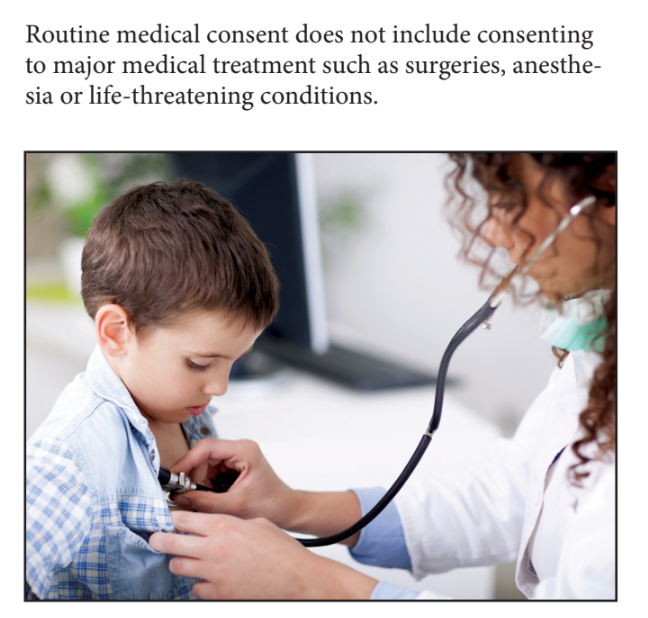
If you’re making decisions for a child, you want to make sure you know what you’re doing- informed decisions. So a lot of what this is is not to make things more difficult for foster parents, it’s not to make you jump through more hurdles, but to make sure that you have that basic health literacy. You want to know what you’re consenting to.
Psychotropic medications are often prescribed for behavioral health and so when you consent to a medication like that (for ADHD or depression/anxiety), we want to make sure you really know what you’re consenting to. So there’s the training and there’s the psychotropic medication certificate. If you don’t know what the side effects are, you might not be able to catch something significant happening with the child.
Trauma is the “great imitator.” We know that children and youth in foster care have or are being diagnosed with mental health disorders at a higher rate than their peers. The training is so important because we see so many kids in foster care being prescribed psychotropic medications.
What do foster parents need to know about working with children with trauma backgrounds?
One thing I’ve learned working with children is that “bad behavior” is just unmet need. So if you have a child in your care and you’re seeing some behaviors that are “bad,” think about what need that child is trying to express. We know these kids coming into care have experienced trauma. And not all trauma requires medication. That’s the conversation. Talk to your doctor. Talk to a specialist. Nationally there is a shortage of child psychologists. It may be hard to find one or to make an appointment. Nationally it’s difficult to get in. That’s why we have some of these care coordination resources that can bridge the gap. They can help you get to a primary care doctor to get you what you need to get you through until you can get that appointment. And there are a lot of innovative practices happening.

Your caseworker is definitely a resource. But the care coordinators, Select Health, the nurses, they can really help bridge the gaps and make connections. Even some schools have mental health services within the school. They can put interventions in during the school days that may help with behavioral concerns. If you have a child who is school-aged and they are having some serious behavioral problems, it’s hard. It’s so hard. We do understand that. We’re hoping to build a system that is helping foster parents not feel so alone.
We need to understand trauma. We need to understand psychotropic medications. There are other interventions you can use before you get to medications or a combination of services. If trauma is really impacting your school life, your relationships, you may need medications. It may take some trial and error.
There are new Regional Child Well-being Teams. How can these be used as a resource for foster parents?
We are building partnerships with entities like Select Health to help pull together professionals that can help support foster parents and birth parents, kinship caregivers. We have folks on the DSS side and on the Select Health team. On the DSS side, we will have a nursing staff of six people on the Well-being Team. The team will look at the child holistically. They will look at their educational needs. Some kids may have charges with DJJ, they are going to look at things going on there. Maybe there are kids that have development delays or intellectual disabilities or are on the autism spectrum. We have individuals that will focus on that. Think of this as a team of professionals that are not just consultants for their case, for the foster parents or case workers, but they’re also there to be resources. To help things get done. I hear a lot, “I can’t get ahold of my caseworkers. They are so overwhelmed!” One of the positive things about these reforms is we really are looking at ways to support our frontline professionals.
Each region is going to have a Well-Being Team. There is a leader of that team and then there are about 11 people on each team. A nurse. A coordinator for therapeutic services. Someone making connections between education and DJJ and helping to get school records. Helping foster parents with IEP meetings and 504 plans. Then you have a person working with CANS (Child and Adolescent Needs and Strengths) as an assessment tool. Helping inform the plan and placement for that child. Then there are two people on the team that are clinical specialists. So these are mental health clinicians who are there to be consultants for case managers. Lastly, we have a large number of individualized services for children in therapeutic care and there is someone that helps with individualized contracts.
These teams are already in place and functioning in every region. We are working on a guide. These are brand new. If all of this doesn’t result in anything better for kids, we don’t need to be doing it. We are here to make sure that kids ultimately get what they need. It’s complicated. It’s difficult, it can be overwhelming.
5 Things SC Foster parents should really know about healthcare oversight of children in care:
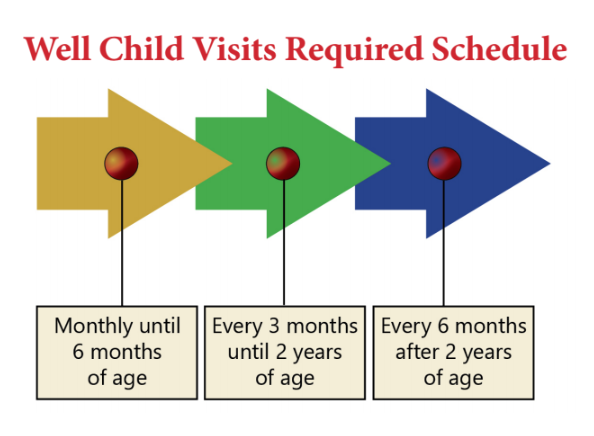
- Updated Child Well-Visit Schedule– Children over two years old should attend well-child visits with pediatrician every six months
- Send the After Visit Summary – Let your case manager know about appointments and send the after visit summary right away. You can use your cell phone to take a picture of the after visit summary and email it to [email protected]
- Communicate with Your Team– share information with your caseworker and your regional well-being team as applicable.
- Participate in Training– Find a way to take the Healthcare Oversight for Children in Care and Psychotropic Medications training online or through in-person group training.
- Answer Calls from Select Health– You can talk to the Select Health team over the phone and provide the information they request. If you’re still uncomfortable, you may call them back (888-276-2020 and press Option #3.)



